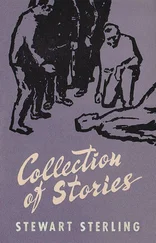The captain got down to business. “What were you after?” he said tersely.
“Her.” He amended it, “My girl, my girl I was going to marry.”
The captain sighed impatiently. “You expected to find her in the cemetery?”
“Oh, I know!” the man before him broke out bitterly. “I know, I’m insane, that’s what you’ll say! I came to you people for help, of my own accord, before it happened — and that’s what you thought then, too. I spoke to Mercer, at the Poplar Street Station, only yesterday morning. He told me to go home and not worry.” His laughter was horrid, harsh, deranged.
“Quit it, shut up!” The captain drew back uncontrollably, even with the width of his desk between them. He took up the thread of his questioning again. “You were arrested just now in the Cedars of Lebanon Cemetery, in the act of disturbing the graves. The watchman at the Sacred Heart Cemetery also phoned us, earlier tonight, that he had found some of the resting-places in there molested, when he made his rounds. Did you do that too?”
The man nodded vigorously, unashamed. “Yes! And I’ve also been in two others, since sundown, Cypress Hills, and a private graveyard out beyond the city limits toward Ellendale.”
The captain shivered involuntarily. The two detectives in the background paled a little, exchanged a look. The captain let out his accumulated breath slowly.
“You need a doctor, young fellow,” he sighed.
“No, I don’t need a doctor!” The prisoner’s voice rose to a scream. “I need help! If you’ll only listen to me, believe me!”
“I’ll listen to you,” the captain said, without committing himself on the other two pleas. “I think I understand how it is. Engaged to her, you say. Very much in love with her, of course. The shock of losing her — too much for you; temporarily unbalanced your mind. Judging by your clothes — what I can see of them under that accumulation of mold and caked earth, and the fact that you left a car parked near the main entrance of Cedars of Lebanon — robbery wasn’t your motive. My men here tell me you were carrying seven-hundred-odd dollars when they caught up with you. Crazed by grief, didn’t know what you were doing, so you set out on your own to try and find her, is that it?”
The man acted tormented, distracted. “Don’t tell me things I know already!” he pleaded hoarsely.
“But how is it,” the captain went on equably, “you didn’t know where she was buried in the first place?”
“Because it was done without a permit — secretly!”
“If you can prove that—!” The captain sat up a little straighter. This was getting back on his own ground again. “When was she buried, any idea?”
“Some time after sundown this evening — that’s over six hours ago now! And all this time we’re standing here—”
“When’d she die?”
The man clenched his two fists, raised them agonizedly above his head. “She — didn’t — die! Don’t you understand what I’m trying to tell you! She’s lying somewhere, under the ground, in this very city, at this very minute — still breathing!”
There was a choking stillness as though the room had suddenly been crammed full of cotton-batting. It was a little hard to breathe in there; the three police-officials seemed to find it so. You could hear the effort they put into it.
The captain said, brushing his hand slowly across his mouth to clear it of some unseen impediment, “Hold him up.” Then he said to the man they were supporting between them: “I’m listening.”
To understand about me, you must go back fifteen years, to 1922, to when I was ten years old. And even then, perhaps you’ll wonder why a thing like that, horrible as it was, should poison my whole life...
My father was a war veteran. He had been badly shell-shocked in the Argonne, and for a long time in the base hospital behind the lines they thought they weren’t going to be able to pull him through.
But they did, and he was finally sent home to us, my mother and me. I knew he wasn’t well, and that I mustn’t be too noisy around him, that was all. The others, my mother and the doctors, knew that his nerve-centers had been shattered irreparably; but that slow paralysis was creeping on him, they didn’t dream. There were no signs of it, no warning. Then suddenly, in a flash, it struck. The nerve-centers ceased to function all over his body. “Death,” they called it, in ghastly error.
I wasn’t frightened of death — yet. If it had only been that, it would have been all right; a month later I would have been over it. But as it was...
His government pension had been all we’d had to live on since he’d come back. It had been out of the question for him to work, after what that howitzer-shell exploding a few yards away had done to him. Mother hadn’t been able to work either; there wouldn’t have been anyone to look after him all day. So there was no money to speak of.
Mother had to take any undertaker she could get, was glad to get anybody at all for the pittance that was all she could afford. The fly-by-night swindler that she finally secured, turned up his nose at first at the sum offered, she had to plead with him to take charge of the body. Meanwhile the overworked medical examiner had made a hasty, routine examination, given the cause as a blood-clot on the brain due to his injuries, and made out the death-certificate in proper order.
But he was never prepared for burial in the proper way. He couldn’t have been or it wouldn’t have happened. Those ghoulish undertakers must have put him aside while they attended to other, more remunerative cases, until they discovered there was no time left to do what they were supposed to. And, cold-bloodedly figuring no one would ever know the difference anyway, simply contented themselves with hastily composing his posture, putting on his best suit, and perhaps giving his face a hurried, last-minute shave. Then they put him in the coffin, untouched, just as he was.
We would never have known, perhaps, but mother was unable to meet even the first monthly payment on the plot, and the cemetery officials heartlessly gave orders to disinter the coffin and remove it elsewhere. Whether something about it excited their suspicions, or it was of such flimsy construction that it accidentally broke open when they tried to remove it, I don’t know. At any rate, they made a hideous discovery, and my mother was hastily summoned to come out there. Word was also sent to the police.
Thinking it still had to do with the money due them, she frantically borrowed it from a loan-shark, one of the early forerunners of that racket, and in an evil hour allowed me to go with her out there to the cemetery-grounds.
We found the opened coffin above ground, lying in full view, with a number of police-officials grouped around it. They drew her aside and began to question her, out of earshot. But I didn’t need to overhear, I had the evidence of my own eyes there before me.
The eyes were open and staring; not just blankly as they had been the first time, but dilated with horror, stretched to their uttermost width. Eyes that had tried vainly to pierce the stygian darkness that he found about him. His arms, no longer flat at his sides, were curved clawlike up over his head, nails almost torn off with futile tearing and scratching at the wood that hemmed him in. There were dried brown spots all about the white quilting that lined the lower half of the coffin, that had been blood spots flung about from his flailing, gashed fingertips. Splinters of wood from the underside of the lid clung to each of them like porcupine-quills. And on the inside of the lid were even more tell-tale signs. A criss-cross of gashes, some of them almost shallow troughs, against which his bleeding nails had worn themselves off. But it had held fast, had only split now, when it was being taken up, weeks later.
Читать дальше












